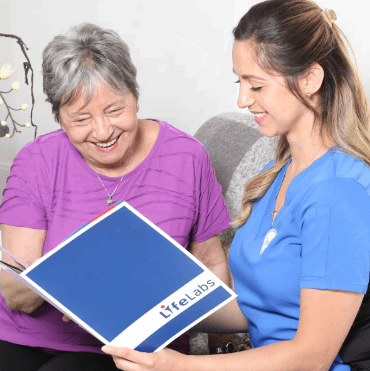Resource Hub
Find Test by Condition
- predict age of menopause
- confirm diagnosis of premature ovarian failure
- predict likelihood of IVF success. (AMH levels correlate positively with number of retrieved oocytes1 and low AMH levels predict a lower likelihood of follicle response.
- assess risk of ovarian hyperstimulation syndrome (OHSS) caused by exaggerated response to gonadotropin treatment
- help diagnose polycystic ovary syndrome (PCOS).
Detecting Rheumatoid Arthritis
The Anti-CCP test is a blood-based immunological test that detects the presence of antibodies directed against the body’s cyclic citrullinated peptide (CCP). These antibodies are frequently detected in the blood of rheumatoid arthritis patients. The Anti-CCP test can diagnose the disease at a very early stage, sometimes years before the development of clinical symptoms.
An Anti-CCP test may be ordered together with a rheumatoid factor (RF) test and JOINTstat to help diagnose rheumatoid arthritis (RA) and to assess the severity and probable course of the disease. Anti-CCP may also be ordered to help evaluate patients at high risk of developing RA, or as a follow-up test to a negative RF test when clinical signs and symptoms of RA are present.
Diagnosing Celiac Disease
Celiac disease occurs in about 1% of Canadians and symptoms can vary dramatically and easily be mistaken for food allergies or intolerance. We offer a combination of two tests that measure the amount of the IgA class (immunoglobulin A) and IgG class (immunoglobulin G) autoantibodies.
- Tissue transglutaminase antibody (tTG): IgA class is the primary test ordered to screen for celiac disease. It is the most sensitive and specific blood test for celiac disease and is the test recommended by the Canadian Celiac Association.
- Deamidated Gliadin IgG antibodies: Around 2-3% of people with Celiac disease have an IgA deficiency, which can lead to a false negative result of the tTG, IgA test. This is when a test to measure IgG is recommended.
Early Detection of Cervical Cancer
Persistent infection with Human Papillomavirus (HPV) is the principal cause of cervical cancer and its precursor cervical intraepithelial neoplasia (CIN). There are more than 118 different types of HPV and approximately 40 different HPVs that can infect the human anogenital mucosa. However, only a subset of these types is considered high-risk for the development of cervical cancer and its precursor lesions.
HPV testing at LifeLabs is done using Roche Cobas® HPV assay, which detects the presence of 14 high risk HPV types, and specifically identifies HPV16 and HPV18.
Detecting Osteoporosis
Serum C-telopeptide (CTX) is commonly used for diagnosing and monitoring patients with osteoporosis. This test measures the amount of bone turnover products circulating in the bloodstream by detecting the C-terminal telopeptide of type I collagen – a protein component of bone.
Serum CTX can detect clinically-relevant change in bone resorption that occurred over as little as a few months, unlike bone mineral density (BMD) radiologic tests which require several years of bone loss to generate a measurable output. Consequently CTX is able to provide better guidance for treatment plans. Serum CTX is the most established test of bone breakdown used in clinical trials of osteoporosis drugs. In combination with BMD test, Serum CTX test may be used to enhance the estimation of the future risk of bone fractures.
Early Prostate Cancer Detection
A prostate-specific antigen (PSA) ratio screening test measures the total PSA level and free PSA levels in the blood. The percentage of measured free PSA is useful in assessing the risk of prostate cancer in patients with borderline or moderately increased total PSA. When combined with your complete clinical assessment, it can help determine whether a follow-up prostate biopsy is required.
In addition to early prostate cancer detection, PSA ratio tests can be used to:
- predict a prognosis (outcome) for prostate cancer
- predict if cancer has spread outside the prostate
- plan treatment for prostate cancer
- monitor the efficacy of prostate cancer treatments
- if cancer has reoccurred
25-Hydroxy Vitamin D Test
The 25-Hydroxy Vitamin D test is a simple blood test and the best way to monitor Vitamin D levels. The test is also known as the 25-OH Vitamin D test and the calcidiol 25-hydroxycholecalcifoerol test. This test should be ordered if there are clinical indications of vitamin D deficiencies including if the patient has conditions commonly associated with vitamin D deficiencies.
Healthcare Providers FAQs
For rush results (NAAT within 12 hours and PCR within 24 hours)
- Order your FlyClear test and receive your FlyClear test requisition
- Book an appointment at a LifeLabs location below.
- Bring your printed FlyClear requisition and Passport
- Select your ordered Province’s Rush Test to start booking:
British Columbia6084 Russ Baker Way
Richmond near AirportOntario6084 Russ Baker Way
Richmond near Airport
Pre-Departure testing now available from the comfort of your home with MyVisit (Currently Greater Toronto Area only)
- Order your FlyClear test and receive your FlyClear test requisition.
- Book your Home Visit appointment with the MyVisit portal or, if your flight is within the next five days, contact a MyVisit coordinator 1-416-993-9579 (Monday – Friday, 9am-5pm EST)
MyVisit Pre-departure testing offers:
- COVID-19 PCR/NAAT swab testing
- COVID-19 Antibody Blood (serology) testing
The MyVisit fee is $80 per person.
Pre-Departure testing
Book your appointment online here. If your flight is within the next five days and you have received your FlyClear requisition, please contact a MyVisit coordinator 1-416-993-9579 (Monday – Friday, 9am-5pm EST).





















